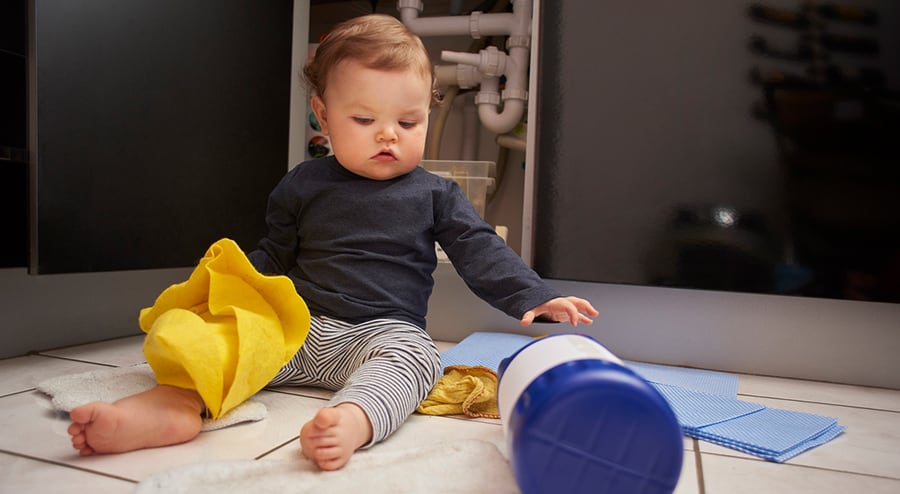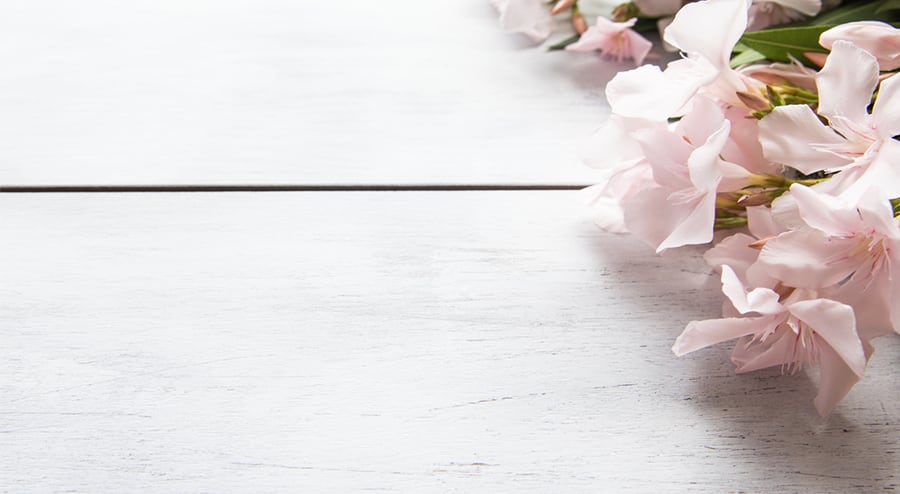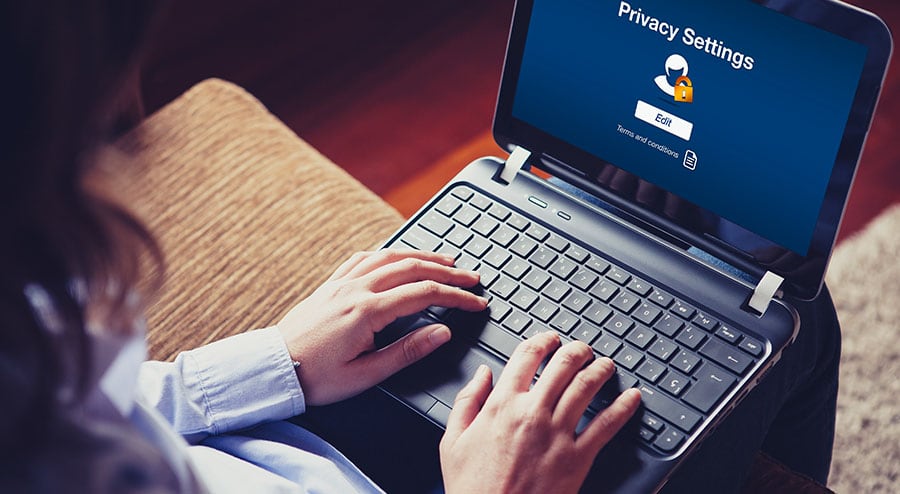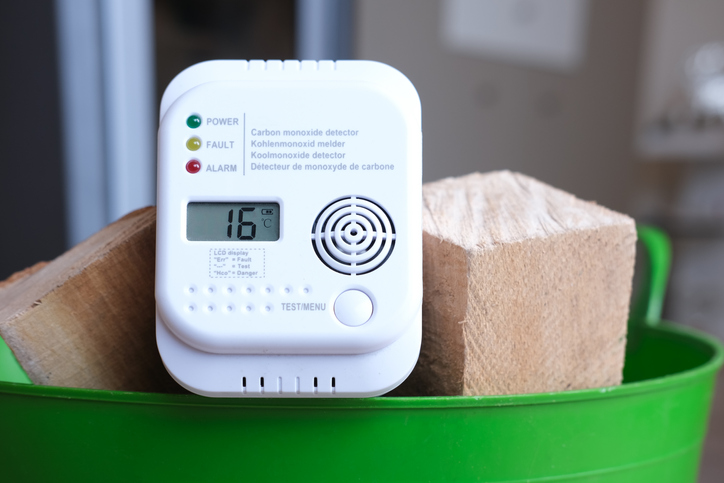According to the CDC, poisoning is the leading cause of injury-related death in the U.S., and poison control centers receive phone calls every 10 to 11 seconds. Poisoning is a real threat to your household, but the good news is that poisonings among adults and children are largely avoidable, if you take the right safety precautions.
Rooms With Poisons
Bathroom
Bathrooms tend to contain cleaners and medicines, both of which are hazardous if improperly consumed. Children are at greatest risk for consuming cleaning products, but adults are also at risk for consuming medications by mistake.
- Get rid of medicines as soon as they expire. To dispose of your medicine, seal it in a baggie and throw it away, or take the medicine to a medication collection day in your area.
- Keep the cabinets under the sink and the drawers that contain cleaning products locked with child-proof locks.
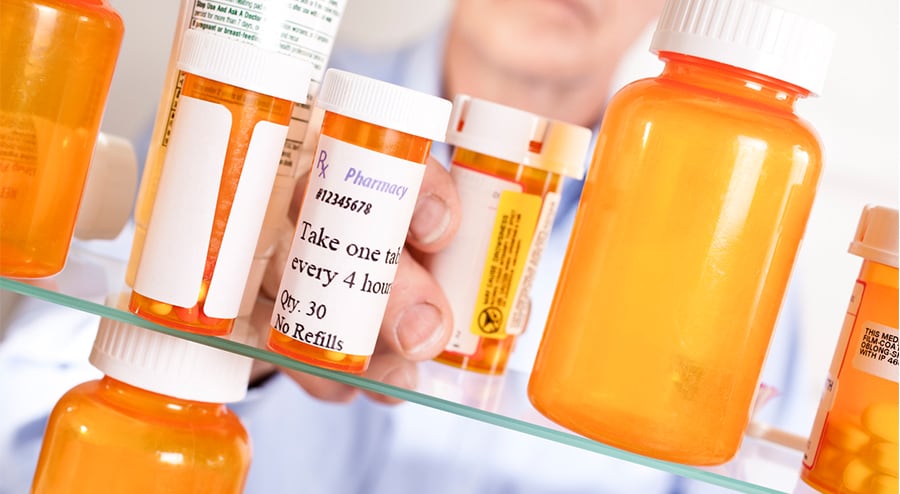
Kitchen
Like the bathroom, the kitchen is a place where people keep cleaning products that are hazardous if consumed. Expired or improperly prepared foods can be a danger as well.
- Read all expiration dates on foods before cooking or eating.
- Smell foods before eating them. Do not eat foods that smell suspicious.
- Keep all cleaning products in a child-proof cabinet, or keep all cleaning products in a cabinet out of reach of any children in your home.
Garage
The garage is a place full of poisons like solvents, paint, cleaning products and car-related chemicals.
- One of the most dangerous chemicals found in the garage is antifreeze, which is known to have a sweet flavor. Buy pet- and kid-safe antifreeze. Although this type of antifreeze can still make your child sick, it’s less harmful than standard antifreeze.
- Keep antifreeze stored in its original container.
- Keep all garage chemicals up and away from your child.
- Never leave containers open: not only are open containers of volatile chemicals a fire hazard, any type of open container is an invitation to poisonings of children and pets.
Laundry Room
Laundry cleaning products and other cleaning products are commonly kept in the laundry room—and they’re sometimes overlooked as potential poisoning hazards. If you keep potential poisons in your laundry room, follow these rules:
- Reseal all laundry soaps after use. Do not leave caps on loose, and do not leave solid soaps in open boxes.
- If you have young children, keep a baby gate in front of the laundry room door.
- Use shelving units and closet organizers to keep your cleaning products out of reach of children.
- If possible, keep the most dangerous products (bleach, peroxide) in cabinets with child-proof doors.
Common Household Poisons
Following best practices for storage, use, and disposal of these common household poisons can help you keep your family safe.
Cleaners
Cleaners are among the most common household poisons. To keep yourself and your family safe, keep the following in mind:
- Read and follow all manufacturer’s directions when using household cleaners.
- Keep all household cleaners in their original packaging.
- Never mix household cleaning products.
- Use cleaners in well-ventilated areas.
- Wear protective gloves when using cleaning products.
- Store cleaners in a cool, dark closet, out of reach of small children.
- Do not dispose of cleaning products down your drain. To find out where and how to dispose of your cleaning products, contact your sanitation department.
Paints/Solvents
Paints and solvents can produce fumes that are dangerous. In addition, solvents can cause skin irritation and can poison anyone who consumes it.
- Screw caps on tightly when putting away paints and solvents. Pound paint lids into place.
- Store paints and solvents in a cool dark space that is locked or unreachable by young children.
- Do not allow paints and solvents to touch your skin.
Medicine
Old medicine can be taken mistakenly by adults, or may be eaten by young children who don’t know better.
- Medicine in the house must be kept in clearly labeled bottles.
- Keep medicine bottles in separate locations to prevent them from being mixed up, especially if the medicine is for two different people.
- Never allow children to dispense their own medicine.
Common Poisonous House Plants
In addition to standard cleaning products, paints and solvents, many house plants are toxic as well. Some of the most common poisonous house plants include:
- Philodendron.
- Pothos.
- Lilies.
- English Ivy.
- Oleanders.
While most adults won’t eat house plants and therefore aren’t affected by this problem, young children are attracted to plants, will tear off leaves and will stick unusual things in their mouths. If you have a toddler or a baby and also have house plants, the best way to protect your child is to keep your house plants up and out of their reach.
Taking Care of Chemical Burns
- Eye burns—If a chemical gets into the eye, flush the eye with lukewarm water for 15 to 30 minutes. Call a doctor or emergency services while performing the chemical flush.
- Skin burns—If a chemical causes a skin burn, flushing the chemical off of the skin with water may help. To ensure proper care, read the manufacturer’s instructions, and follow the recommended advice from poison control.
Creating a Plan for a Household Poisoning or Chemical Burn
To protect yourself and members of your family, know the signs of poisoning and have a plan in place for treating poisons and chemical burns. Symptoms of poisoning include:
- Nausea, vomiting, and stomach pain
- Drowsiness and fatigue
- Headache
- Loss of appetite
If someone in your household has consumed poison, determining what kind of poison was consumed may be important. You may notice clues like medicine lying out that should not be left out, spilled cleaner on the floor, and other warning signs. This is evidence that you should remember when calling Poison Control. Note, too, that at one time, syrup of ipecac was recommended to induce vomiting. This method is no longer recommended practice and any bottles of syrup of ipecac should be removed from your household.
If you suspect that someone in your household has consumed poison, contact Poison Control at 1-800-222-1222. Poison control centers are staffed by experts, the service is free and confidential, and poisoning emergencies can often be addressed via advice given by the center rather than by calling 911 or visiting an emergency room.
Educate Family Members
Educating members of your household and family members about poison protection procedures is the best way to ensure that members of your household will be safe from accidental poisoning. Teach all your family members to call Poison Control if poisoning is suspected, and keep the phone number for Poison Control posted on your refrigerator.
Poisoning may be one of the greatest threats to the safety of those in your home, but taking precautions and knowing how to respond can help prevent the worst from happening—and give you peace of mind.


